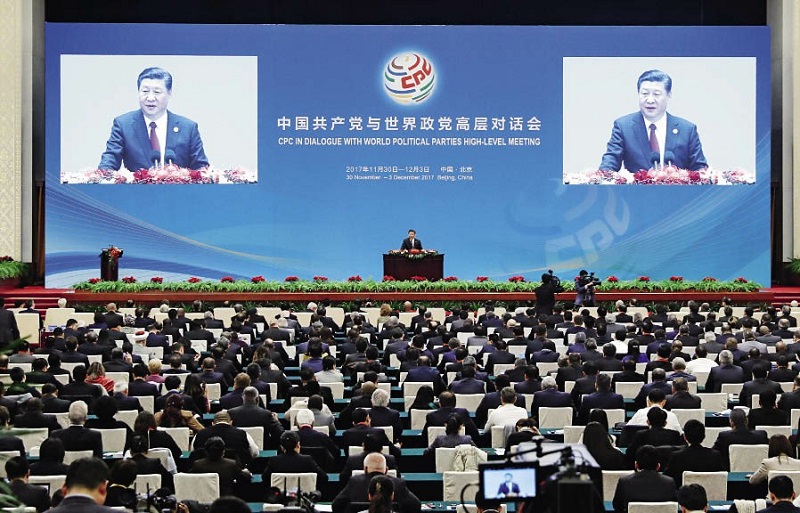The year 2021 marks the centenary of the founding of the Communist Party of China (CPC). It’s also an occasion to review the CPC’s exchanges with the rest of the world. Taking the central role in directing China’s progress on revolution, reconstruction, reform, opening-up, and modernization, the CPC has maintained a close connection with the rest of the world since its establishment.

General Secretary of the CPC Central Committee and President of the People’s Republic of China Xi Jinping delivers a keynote speech at the CPC in Dialogue with World Political Parties High-Level Meeting held at the Great Hall of the People in Beijing on December 1, 2017.
International Exchanges Throughout the Party’s Evolvement
When the CPC was founded at a historical juncture in 1921, it took on the responsibility of saving the country from destruction. In the following decades it transformed China from a semi-colonial and semi-feudal society to a socialist country with Chinese characteristics.
Over the past 100 years, the CPC’s international exchanges have played an important role in China’s pro-gress and development. They have also contributed to the country’s independence, people’s liberation, and national rejuvenation.
In successfully leading the Chinese people in carrying out a democratic revolution, achieving national independence, establishing socialism, carrying out opening-up and reform, and building socialism with Chinese characteristics, the CPC has integrated the drive of national rejuvenation with the cause of human progress, and has been dedicated to promoting world peace and development. In the process of formulating and implementing its foreign relations principles and policies, the CPC has paid much attention to the changing international situation and set specific goals and tasks on the basis of its pursuit of internationalism and global peace. It strives to adapt its policies to the trend of the rest of the world in order to make more contributions to human development.
Three Historical Stages
Since the very establishment of the CPC, it has taken as its own mission the realization of national rejuvenation.
The history of the Party’s foreign relations can be divided into three stages. The first stage was from 1921 to 1949. During this period, the CPC focused on toppling the three mountains of imperialism, feudalism, and bureaucrat-capitalism that were oppressing the Chinese people, and realized China’s independence. As it became the ruling party upon the founding of the People’s Republic of China (PRC) in 1949, inter-party exchanges began to contribute new importance to state diplomacy. During the second stage from 1949 to 1978, foreign affairs of the Party, in addition to consolidating the status of the PRC, also supported national liberation and human development in the rest of the world. Despite twists, turns, and setbacks in the process of exploration, the CPC made brilliant achievements in international exchanges. During the third stage from 1978 — when reform and opening-up was launched — to 2021, the CPC’s international relations have followed the principle of putting national interests first and serving the country’s overall diplomatic agenda, thus undergoing a historical transition. This change has introduced a new dynamic into China’s diplomacy and opened new historical opportunities for China’s development.
Over the past 100 years, the Party’s foreign relations have served two roles: They have been both a crucial front for the cause of the Party and an inseparable part of China’s diplomacy. In conducting international exchanges, the CPC has adapted Marxism to China’s reality and integrated the efforts of national rejuvenation with the global progress. China’s phenomenal development under the leadership of the CPC has demonstrated the powerful vitality of scientific socialism, expanded the path to modernization for developing countries, provided new options to the countries who want to accelerate their development while maintaining independence, and contributed China’s experience and solutions to the problems facing humanity.
Global Network of Political Party Partnerships
In the new era, the CPC has maintained close relations with more than 600 political parties in more than 160 countries and regions, building a comprehensive, multi-channel, wide-ranging, and high-level global network of partnerships with them. The CPC in Dialogue with World Political Parties High-Level Meeting held in Beijing in December 2017, attracted more than 600 people, including representatives of nearly 300 political parties and organizations from more than 120 countries to attend. During the event, participants discussed the solution of issues impeding human development and the joint efforts to build a better world by promoting a community with a shared future for mankind. The high-level dialogue has become a political communication platform with broad representation and international influence.
The CPC’s glorious achievements in the international exchanges also serve as a contribution to the progress of the whole world. Looking forward into the next century, under the strong leadership of the Communist Party, China is advancing major-country diplomacy with Chinese characteristics to build a new type of international relations and a community with a shared future for mankind. As its international influence, ability to inspire, and power to shape continue to rise, China will make great new contributions to global peace and development.
WANG LEI is associate professor at the School of Government, Beijing Normal University, and director of BRICS Cooperation Center.